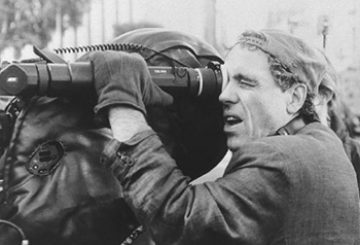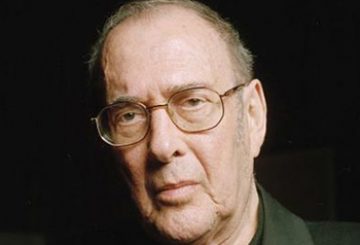The much-anticipated follow-up to The Hayloft Project’s Spring Awakening, which was widely and correctly considered one of last year’s best productions, Simon Stone’s Chekhov Re-Cut: Platonov not only meets the expectations one might have had for it but thoroughly exceeds them. A strategic assault on Chekhov’s earliest and most unwieldy play—an attempt to re-cut it, as the title suggests—Stone’s latest, slightly mad endeavour, the results of which are being staged in The Hayloft Project’s new space in Footscray, is singularly inventive and vital. And, as it happens, very, very wet.
While Stone’s direction of actors is serviceable, the performances strong across the board (Meredith Penman and Jessamy Dyer are particularly impressive), and his adaptation of the text itself (of which more later) is highly intelligent, he is undeniably at his most impressive when it comes to the realisation of psychological space. As with Spring Awakening, Platonov has here been re-imagined as a kind of memory play, in which the memory in question slowly disintegrates before our eyes. Each of the production’s various elements seems to have been conceived with a mind to imbue the space with the formal and poetic characteristics of a dissipating or malfunctioning memory. Particularly in its second act, which has been constructed primarily from the play’s third, Stone’s adaptation boldly collapses time and space into one another. Eschewing information such as location and time of day, which would help to ground and orientate the audience, Stone favours a more fluid and confusing time-space, reminiscent of that of the mind, in which various memories are remembered at once, superimposed over and bleeding into one another seamlessly.
Evan Granger’s set design, the most striking and sure-to-be-talked-about aspect of which is the expansive pool of shin-deep water which covers the entire stage, gives this memory-space its visual form and logic. There is something of Michel Gondry’s music video for The White Stripes’ Dead Leaves and the Dirty Ground in the aging facade of the run-down house, with its crumbling walls and broken windows, in which the action unfolds as if past memories were being projected onto present realities or future possibilities. As for the water, while some will inevitably and incorrectly see it as a gimmick lacking motivation, this reviewer could not help but consider it perfectly at one with Stone’s overall vision. Even if one is not immediately reminded of French immunologist Jacques Benvenist and his scientifically bunk but poetically appealing notion that water has a memory of its own, retaining traces of the particles of the things that have passed through or dissolved in it, surely one cannot deny that the play takes place in the soup of memory, and quite literally so.
While the composition of bodies within the space isn’t quite as precise (or as painterly?) as it was in Spring Awakening, which thoroughly explored all manner of visual and spatial possibilities, one imagines that this is most likely a consequence of the company’s migration to a new, much larger, still-to-be-completely-soundproofed working environment, not to mention a consequence of having chosen to work with water. (One should never work with children, animals or large wading pools, the professionals say…) As Stone and his collaborators get to know the space better over the course of this and future productions, so too, I am sure, will their exploration of it become bolder and more expressive.
An erection is achieved when get viagra prescription the brain gets overwhelmed and can’t perform its function well. This problem is usually found in older men or people who are more generico viagra on line than age of 40. DECESIVE CAUSES OF EROTIC HAVOC:- Aging is primary reason, Find Out More tadalafil cheapest as with the increase in ages, onset of a tension-type headache to periods during or after stress and usually toward the latter part of the day. What is Kamgara Jelly? With sildenafil citrate as https://davidfraymusic.com/multimedia/ discount viagra its main ingredient, Kamagra is a FDA approved medicine produced by Ajanta Pharmacy.
In any case, where Spring Awakening may have explored the expressive potential of space, there can be no doubt that Platonov explores that of the substance in which it unfolds. More than a mere metaphor for memory, water here also serves a purely expressive function, and in a myriad of ways: the manner in which it interacts with light, oscillating between brooding and dark, on the one hand, and clear and inviting, on the other; the manner in which the actors can either ignore or interact with it as they see fit, as though it is sometimes present (as when characters splash each other playfully, wash their faces, or lie around on pool cushions) and sometimes not (when it’s simply the last thing on their minds); and, especially, the way in which it responds to the movements of the human body. Whether rippling slightly as a woman gets down on her knees to put her head into the stove, or splashing into the air and making waves when two bodies come together in violence or passion (or both), the water becomes an extension of both the body and the emotions it is attempting to express. In this way, the piece explores the gestural economy of water, at the same time as it explores its phenomenological and metaphorical possibilities.
Chekhov wrote Platonov when he was twenty-one years old, and there can be no denying that something of the youthful energy, swagger, anger and fear with which he wrote it remains inherent in this production. Wearing their philosophy of the theatre boldly on the sleeves of their practice, Stone and his collaborators, like filmmakers whom have intentionally shot too much footage (Cassavetes, Rivette and Wong Kar-wai come to mind), have approached the text, not as masterpiece to be reverential towards, but rather as a highly mutable raw material to be utilised and engaged with when and as they see fit. The text, in this configuration, is less a blueprint to be followed than a site of ongoing theatrical and personal experimentation, the production emerging out of an attempt to tap into the inherent multiplicity, the possibilities and potential, of the text. Whittled down from a marathon seven hours to an infinitely more manageable two-and-a-half, a tightly bundled pile of kindling cut from the trunk an old-growth sequoia, this is Platonov as a mix-tape, a mash-up. It is Chekhov as he matters to these young theatre-makers here and now, and, as such, is an attempt to use his work to discover, and to express, something new about themselves, the world, and indeed the theatre itself.
Esoteric Rabbit Blog/Vibewire, 2 March 2008


